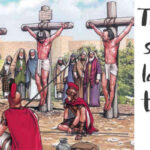It’s Easter again, a time to reflect, consider, remember and perhaps repent. And also a time to rejoice, celebrate and be thankful. Like so many other Christians, I’ll be doing all that.
A group of us have followed Jesus’ journey from Galilee to Jerusalem, as recorded in Luke’s Gospel, with him making clear that like other prophets, he would die there.
Which inevitably raised the question: Did he necessarily have to die? Why? Who benefited from his death? It sounds so counter-intuitive that his death can affect me. Some say it is demeaning God’s character to say he required Jesus to die so he could forgive me.
So, this Easter, is there a good way to think about Jesus and the atonement?
So many theories …
It is a fundamental of Christian that Jesus died for our sins. Everyone knows it, even those who don’t believe it. It’s called “atonement” and it’s part of the package.
But, being human, we want to understand why. What was achieved by his death? How does it work?
Theologians don’t shirk challenges like these and they have come up with more than a dozen atonement theories. (In Why did Jesus have to die? I outline 15 different theories.)
Some theories (e.g. Penal Substitutionary Atonement [PSA], Satisfaction) say Jesus had to die to satisfy God’s sense of justice or honour, or his wrath for our sin. Other theories (e.g. Ransom, Christus Victor) say Jesus died to defeat the devil or death or evil. Still other theories (e.g. Moral Influence, Representative) say Jesus died to change us and open up the way for us to follow him.
So we have plenty of ideas to choose from.
… so little understanding
But there are fierce discussions and arguments about which view is correct and which other views are inadequate. (Just Google “Penal Substitutionary Atonement” and you’ll find heaps of these.)
One group says PSA is the only theory that a Bible-believing Christian can hold, or at least the most fundamental and necessary. Those who oppose it are denying the faith and avoiding admitting the depth of human sin. It is what the Bible teaches and many of the early church fathers taught something very close to it.
Others say PSA is brutal and makes God out to be a monster. It isn’t historically what the church believed for 1500 years until the Reformation. Guilt cannot be imputed to someone else. The Catholics believe in substitutionary atonement, but don’t believe it is penal (i.e. God was not punishing Jesus). Some say God never wanted sacrifice but only used that idea because it was prevalent in Old Testament times.
Proponents of PSA reply that it indeed was the belief from New Testament times until now. It isn’t cosmic child abuse and abuse victims can be helped. And critics of PSA respond that it is being read into scripture rather than actually found there.
Claiming more than we can know?
Are you confused by all that? Do you wonder why all the fuss?
Do you wonder how so many different and opposite opinions can be expressed with so much certainty?
I feel a little like Miracle Max in The Princess Bride:

I can’t help feeling that sometimes theologians affirm more than they can actually know. And us laypeople are even more susceptible. God is a mystery and he has only revealed a small amount of the truth about himself. Yes, enough truth to know him, but not enough to explain everything about him.
4 things we may be able to affirm
So here’s my attempt at a stripped down bunch of beliefs about Jesus’ death.
1. Jesus chose to die for our sakes
Whatever atonement theory we hold to, we can surely affirm this (2 Corinthians 5:21). At his last Passover meal, Jesus told his disciples: “This is my body given for you” (Luke 22:19) and “This is my blood of the covenant, which is poured out for many” (Mark 14:24).
2. The purpose of his sacrifice was to redeem
The Jewish sacrificial system is well established in the Bible, and Jesus referred to it in relation to his own purpose: “the Son of Man did not come to be served, but to serve, and to give his life as a ransom for many” (Mark 10:45).
Perhaps most Christian proponents of one view or the other look to the Bible to reinforce their theology. But secular historian Maurcie Casey wrote (in his book, Jesus of Nazareth, p408) that Jesus “intended to die, and …. he interpreted his death as an atoning sacrifice for the sins of Israel”. This follows the view of classical historian Michael Grant that Jesus believed “his death was destined to save the human race“.
As a Christian I may believe more than these historians conclude, but I cannot really believe less. Jesus’ sacrifice had the purpose to redeem or save, however I may understand that.
3. God is love
We all know this (from 1 John 4:8). But some expressions of PSA present God in a very unloving way. A minister tells the story of how he used as an Easter analogy a true story of Auschwitz where a prisoner escaped and ten inmates were selected at random to be executed in response. One of those selected began to sob. “My wife and my children”. A priest offered to die in his place and the offer was accepted. The “saved” man survived the war to see his family again.
So the minister said to his congregation, we are like the man facing death, and Jesus is like the priest who submitted to death in his place. Classic PSA. But then he wondered, in that analogy, is the God figure the German commandant? Is that what he believed?
The analogy is far from perfect, as all analogies are, but it surely makes me think too. Do our expressions of the atonement paint God as unloving? Are we allowing our theological interpretations to misrepresent a loving God?
4. No single theory can portray the whole truth
CS Lewis said that Christians are required to believe in the atonement, but not obliged to believe in any particular theory. In this he was followed by some eminent Protestant theologians:
- Leon Morris believed we need “all the theories. …. Even when we put them all together, we will no more than begin to comprehend a little of the vastness of God’s saving deed.”
- JI Packer cautioned against thinking we can fully understand these mysteries, and believed all the main theories contain truth.
Humility is an important attitiude for Christians, especially at Easter. May we have a little humility about the atonement theories we hold, and a lot of love for those who find a different theory more meaningful.
Read more about the atonement
Read more about all the theories in Why did Jesus have to die?
Graphic: Free Bible Images.





Well, it is certainly very complex and beyond my simple brain to understand.
I tend to the more basic view that Jesus’ death was necessary to “spread the word” and to replace the wrathful God of the Jewish Testament with a more loving entity that acted for all humanity rather than for the Jewish people alone. That is probably too simplistic in view of all the other theories expressed here but maybe it is part of the truth.
In any case, whatever your interpretations, I hope everyone has a safe and reflective Easter.